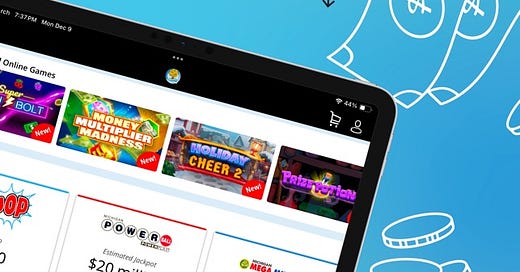In general, I’m a free market guy. I abide by the 1990s libertarian ethos of “if it doesn’t hurt anyone, its none of your business”. I also reject the paternalistic nature of some when it comes to public policy. I don’t think “people are dumb”. They might not make decisions that you find optimal, but I have no illusions that some bureaucrat that has never met you can run your life better than you.
So I think things like a state lottery are more or less okay. A few important things to note about the lottery:
Households earning under $10,000 annually spend $597 per year on lottery tickets
A survey found 28% of Americans earning under $30,000 play the lottery, spending an average $412 annually on playing the lottery
So the lottery is a big negative expenditure on low income households. But since I reject the paternalistic view that policy should try to “protect” low income individuals from themselves, I’m still mostly okay with the lottery.
My problem is that the state lottery system tries to optimize their revenue.
Does the state really need to spend $500 million a year advertising the lottery? It’s not a surprise that the state advertises, every $1 in advertisements results in $128 in ticket sales. But do they have to?
I get that the lottery is an escape valve for some and maybe scratches an itch that would otherwise be filled with illegal gambling. But why is the state trying to encourage the activity?
Worse than that, do we really need mobile apps that let you play the lottery?
In traditional economics, you figure that there is some benefit to consumption, above what the person pays. For instance, I may value a restaurant meal up to $30, but the restaurant charges me $20 and it costs them $10 to produce. So overall well being increases by $20 ($10 consumer surplus and $10 producer surplus). So voluntary commerce is necessarily good, although the surplus often accrues more to one party.
But I don’t think we should apply this to negative return things the lottery. Again, I’m not saying it should be illegal but just doesn’t have to be optimized.
Sports gambling, optimized
You see the same thing with sports betting. I’m okay with it in general, but do we really need every sporting event sponsored by a gambling app? Do we need to have updated live odds during games? Why can’t we leave some things as unoptimized?
Sports gambling is a little harder since it involves private competitors in this space. But the willingness for centralized organized sports leagues to jump into bed with gambling sites took me by surprise.
Prior to the legalization of sports betting, I believed legalization would lead to a new financial industry that tried to professionally forecast events. The benefits to society would be somewhat dubious, but not necessarily harmful. I like numbers and the financial industry as a whole.
Fast-forward to today and if you win enough, you’re banned off gambling sites. Rather than build out sophisticated hedging, risk management, and market making, sports gambling sites just decided to serve the dumb money market. This ensures that it is necessarily a net negative to anyone that plays long term.
Other examples include legalized marijuana, which seems to be driven by serving the heavy user. You see THC levels going up and marketing towards daily users.
Overall, this comes back to an overly number driven society that tries to quantify the good life through easily quantifiable things. How much of our economic progress is due to advertising optimization or new markets that increase quality of life in all but the ways that matter?



